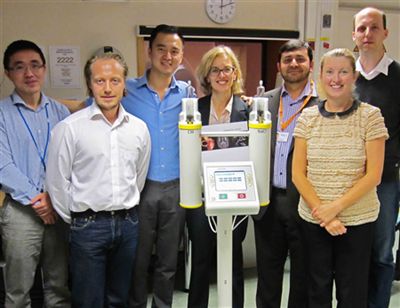Post-doctoral research scientist Dr Yuehui Tao, Medtron international sales area manager Raphael David, DPhil candidate Dr Alexander Liu, chief technologist Jane Francis, Guerbet regional manager Husain Salwati, Guerbet product manager Barbara Suggitt and Medtron deputy head of development department Michael Schweimann.
Oxford University’s cardiac MRI team is conducting a study using MRI at 7.0T to assess heart disease. Based at the Oxford Centre for Clinical Magnetic Resonance Research, the team is comprised of research clinicians, technologists and technical staff, managed by Professor Stefan Neubauer. It is aiming to utilise the additional signal to noise ratio that can be achieved at 7.0T to improve the diagnostic accuracy of cardiac MRI. The magnet itself was installed in July 2011 by a local company.
In an attempt to open the door to previously impossible levels of disease sensitivity, the team injects a contrast agent using a power injector, the Accutron MR provided by Medtron and distributed in the UK by Guerbet. “The effects of contrast agents are more pronounced at 7.0T making, for example, perfusion scans clearly superior,” said chief technologist Jane Francis. “Achieving the increased sensitivity to disease may provide the key to understanding coronary disease and allow us to improve the clinical pathway.”
See the full report on page 16 of the January 2014 issue of RAD Magazine.


